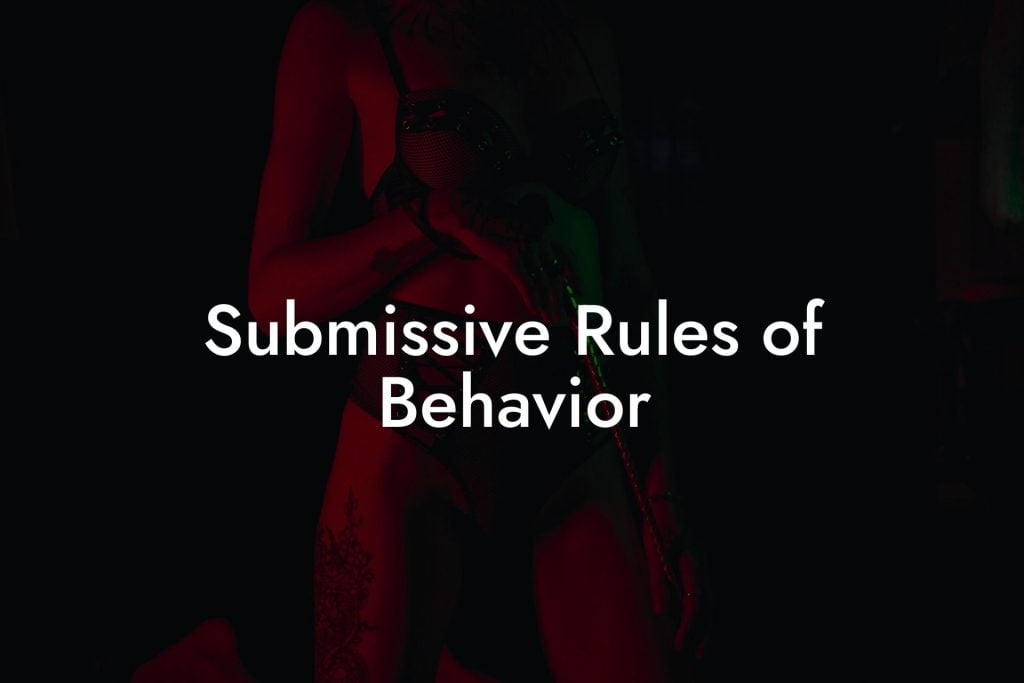BDSM, an abbreviation for Bondage, Discipline, Dominance, Submission, Sadism, and Masochism, is a fascinating realm that has captivated countless individuals. This intimate practice involves a consensual power exchange, where partners explore their desires, boundaries, and fantasies. At Filthy Adult, we believe in providing a comprehensive understanding of BDSM, including the fundamental aspect of BDSM rules. In this article, we will delve into the essence of BDSM rules, their significance, and how they enhance the experience.
In any BDSM relationship, consent is the cornerstone of trust and respect. It’s more than just saying “yes” or “no”—it’s about openly communicating your desires, limits, and expectations. But trust doesn’t end with a conversation—it’s built through ongoing, clear agreements. That’s where our Dominant & Submissive BDSM Contract Pack comes in. Find out more →
BDSM rules serve as a guideline for participants to establish boundaries and establish a foundation of trust and consent. Without them, the power dynamic within BDSM encounters may become blurred, potentially leading to confusion, discomfort, or even harm. By adhering to various rules, individuals can fully immerse themselves in the intense and pleasurable experience BDSM offers. Let's explore three essential categories of BDSM rules:
Consent and Communication
Consent lies at the core of BDSM. It ensures that all activities are entirely consensual, respectful, and safe for everyone involved. Establishing a clear and comprehensive understanding of each participant's desires, limits, and safe words is crucial. Open communication before, during, and after BDSM sessions is vital for creating a safe and pleasurable experience. This includes discussing hard and soft limits, setting boundaries, and continuously checking in with each other's well-being.
Negotiation and Planning
BDSM thrives on negotiation and planning between partners. It involves discussing roles, power dynamics, scenarios, and activities prior to engaging in any BDSM play. Negotiation helps identify preferences, interests, and any potential triggers or fears. By addressing these factors, a stronger bond is formed, and partners can align their desires and expectations. Planning the scene, including setting a safe environment with appropriate BDSM tools and equipment, contributes to a successful and fulfilling experience.
Aftercare and Reflection
Aftercare is an essential aspect of BDSM that takes place after a scene. It involves providing care and emotional support to each other, promoting a sense of safety and comfort. Aftercare can include cuddling, offering water or snacks, and engaging in open communication about the experience. Reflection is also crucial, as it allows individuals to discuss what worked, what didn't, and how the experience can be improved for future encounters. This open and honest reflection helps strengthen the emotional bond between partners.
Looking for the best BDSM & Kink OnlyFans content creators? Here is a list of of our favourites that you will love:
-
- Best BDSM & Fetish OnlyFans - Molly✨ >> Link
- Best BBW & Huge Ass OnlyFans - Naughty Hanna Zimmer 💜🎀 >> Link
- Best Sexy Gaming Nerd OnlyFans - 🎮 Gracy EstuSWEET 🎮 >> Link
- Best Fetish & Kink Messaging OnlyFans - 💫Lola La Fleur 💫 >> Link
- Best Girl Next Door OnlyFans - ☀️Lily ⛅ >> Link
- Best Tiny European OnlyFans - 💝 Ami Allison 💝 >> Link
- Best Cosplay OnlyFans - 🐱 Little Kitty Kate 👉👌 >> Link
- Best Little OnlyFans - 🧸 Katya 🙇♀️ Sun >> Link
- Best Sub OnlyFans - 🍌Hanna Banana🍌 >> Link
- Best Teen & Huge Tits OnlyFans - ❣️Anny❣️19 y.o. BUSTY student girl >> Link
- Best Tiny Tits OnlyFans - ⍣⭐️ Sofia Parker ⭐️⍣ >> Link
- Best Sub & Huge Boobs OnlyFans - Nika Huge Boobs >> Link
- Best Kink OnlyFans - Julia Pearl🐚 >> Link
- Best Fetish & Girl Next Door OnlyFans - Hillary is Wet 💦 >> Link
- Best Dirty Latina OnlyFans - Paula Flores 😈 >> Link
Not quite what you are looking for? View the full list →
Frequently Asked Questions
What is a BDSM contract?
A BDSM contract is a written agreement between consensual participants in the BDSM community that outlines the expectations, boundaries, roles, and responsibilities of each person involved. This document often clarifies the power dynamics in play, sets the duration of the relationship or scene, and includes safety protocols. While not legally binding, it serves as a symbolic commitment to mutual respect and understanding.
Are BDSM contracts legally enforceable?
No, BDSM contracts are not legally enforceable in most places. They are considered private agreements that outline consent and preferences but do not hold up in court as legally binding documents. Their primary purpose is to foster open communication and set expectations between the participants.
How do power dynamics work within a BDSM context?
In BDSM, power dynamics involve a negotiated exchange of control between the dominant and submissive parties. The dominant takes on a controlling and guiding role, whereas the submissive gives up some level of control, within agreed limits. These dynamics can play out in various scenarios and are defined by the preferences and limits stated in the BDSM contract.
Why is consent important in BDSM?
Consent is the cornerstone of BDSM interactions. It ensures that all activities are agreed upon by every participant and that no one is coerced or forced into any situation against their will. Without clear and enthusiastic consent, activities can become abusive or harmful. Consent must be informed, voluntary, revocable, and specific to the scenarios being enacted.
How can trust be built between BDSM participants?
Trust between BDSM participants can be built through open communication, respecting boundaries, consistent aftercare, and honoring the terms set out in the BDSM contract. Building trust is an ongoing process that requires time, patience, and a commitment to each other's well-being.
What safety measures should be taken during BDSM activities?
Safety measures in BDSM include agreeing on safe words or signals, understanding each other's physical and emotional limits, providing necessary safety equipment like scissors for quick release from bondage, ensuring aftercare post-scene, and having a plan for emergency situations. Educating oneself on the risks and proper techniques involved is also crucial for safe BDSM play.
How are hard limits and soft limits defined in BDSM?
Hard limits in BDSM refer to activities or scenarios that an individual is not willing to engage in under any circumstances. These are non-negotiable and must be respected without exception. Soft limits are activities that a person may be hesitant about or uncomfortable with but may consider with the proper care, negotiation, or situation. These are not absolute deal breakers but require caution and further discussion.
Can a submissive revoke consent in a BDSM scene?
Absolutely. A submissive—or any participant—always has the right to revoke consent at any point if they feel uncomfortable, unsafe, or unwilling to continue. The use of safe words or signals allows for immediate communication of the desire to stop or alter the scene.
What is aftercare in BDSM?
Aftercare refers to the attention given to participants after a BDSM scene or interaction. It can include physical care, such as tending to any marks or providing warmth, as well as emotional support, like reassurance and debriefing the session. Aftercare addresses the need to transition out of the power dynamic roles and ensures the well-being of all those involved.
How does one negotiate a BDSM scene or relationship?
Negotiating a BDSM scene or relationship involves open and honest communication about desires, limits, experiences, expectations, and safe practices before engaging in any activities. This conversation helps to ensure that everyone is on the same page and agrees to the terms and structure of the interaction. Essential components include consent, duration, activities included, and safety measures.
What's the difference between a scene and a relationship in BDSM?
A scene is a specific period where BDSM activities occur, often with a beginning, middle, and end, and may involve role-play or power exchange. A BDSM relationship encompasses the connection between participants beyond individual scenes and may include multiple encounters, a deeper power dynamic, personal growth, and emotional investment.
Is it normal to feel uncertain or nervous about trying BDSM?
It is entirely normal to feel uncertain or nervous about exploring BDSM, as with any new experience. Curiosity and caution are natural responses. Potential participants are encouraged to learn about the practice, communicate openly with potential partners, and start slowly with clear boundaries to ensure comfort and safety.
What are safe words, and why are they important?
Safe words are predetermined words or signals used to communicate during a BDSM scene. They are essential because they indicate when someone needs to pause, check-in, or stop the activity altogether. Choosing a word that wouldn't typically arise in a scene prevents misunderstandings and ensures that all parties can play safely and confidently.
Can someone be a dominant or submissive without sexual involvement?
Yes, individuals can engage in dominant or submissive roles without sexual involvement. BDSM is not inherently sexual and can involve power exchange, sensation play, and emotional connections that don't include sexual activity. The nature of the relationship is defined by the participants' desires and agreements.
Do people who practice BDSM need professional mental health support?
Engaging in BDSM does not mean someone requires professional mental health support simply because of their interests unless it stems from or leads to emotional or psychological distress. Like anyone, individuals who practice BDSM may seek mental health support for various reasons. Mental health professionals can offer nonjudgmental support and help navigate any challenges related to or separate from BDSM practice.
What is the significance of collar wearing in BDSM?
In the BDSM community, wearing a collar can symbolize the relationship between a dominant and a submissive, reflecting ownership, protection, and commitment. It may be part of a scene or represent a more permanent dynamic. The significance is highly personal and varies by those involved.
Can people with disabilities participate in BDSM?
People with disabilities can absolutely participate in BDSM. Accessibility, comfort, and safety can be tailored to individual needs through open communication and creative adaptation of activities and equipment to ensure an inclusive and enjoyable experience.
How can I ensure my privacy while participating in BDSM?
Privacy can be maintained by engaging in consensual activities in a safe, private space, being selective and discreet when sharing personal information, using pseudonyms if desired, and by working with trusted partners who value confidentiality.
Is jealousy a common issue in BDSM relationships?
Jealousy can arise in any relationship, including BDSM relationships. It's essential to address feelings of jealousy openly and constructively, seeking to understand and manage emotions while maintaining the agreed-upon terms of the relationship.
How can someone safely explore BDSM for the first time?
Exploring BDSM safely for the first time involves conducting thorough research, engaging in self-reflection to understand personal desires and limits, communicating these to a potential partner, starting with less intense play, and involving oneself in the BDSM community to learn from more experienced practitioners. Prioritizing consent, safety, and well-being is paramount.
Does participating in BDSM impact a person's reputation or career?
Participation in BDSM should not impact one's reputation or career as it is a private and consensual aspect of a person's life. However, due to societal misconceptions and stigma, discretion is often advised, especially in professional contexts or in communities where BDSM is misunderstood.
We hope this article has provided valuable insights into the significance of BDSM rules. Remember, engaging in BDSM requires understanding, consent, and open communication. Exploring Filthy Adult further will allow you to delve into our Ultimate BDSM Contract Pack, read other informative guides, and explore our fetish shop to add exciting elements to your intimate experiences. Share this article with fellow enthusiasts and ignite the passion for safe and consensual exploration!













